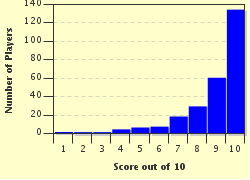Quiz Answer Key and Fun Facts
1. You get off the plane and see your ride to your hotel. You then say "Ni hao" What did you just say?
2. Your driver then says he will take you to your hotel. You reply "Xie xie". What did you tell him?
3. After you get to your hotel, you say to your driver "Zai jian". What did you say?
4. The person at the hotel starts speaking in Cantonese and you cannot understand her so you say (unfortunately for the employee, in Mandarin) "Shenme?" What have you said to the hotel employee?
5. The lady keeps speaking Cantonese, so you try to make her understand your problem. You respond "Wo bu dong". What have you said to her now?
6. The lady still will not speak English or Mandarin, so you say "Ting!". What does this mean?
7. After that fiasco you decide it will be easier to tell people "Wo shi mei guo ren" when introducing yourself to them. What are you telling them?
8. In China you are finding your Chinese to be worse than you thought it was, so you decide to open your conversations by asking "Ni shuo ying wen ma?". What are you asking people?
9. You are looking at a map and see some words that you recognize when you are trying to find directions to the Beijing Olympic Stadium. These words are "Yi, er, san, si, wu" What did you recognize?
10. Street vendors and shop owners around Beijing can be really pesky. You want to order some Chinese food from one of them, so you ask for "mi fan" What are you ordering?
Source: Author
geowhiz
This quiz was reviewed by FunTrivia editor
stedman before going online.
Any errors found in FunTrivia content are routinely corrected through our feedback system.

